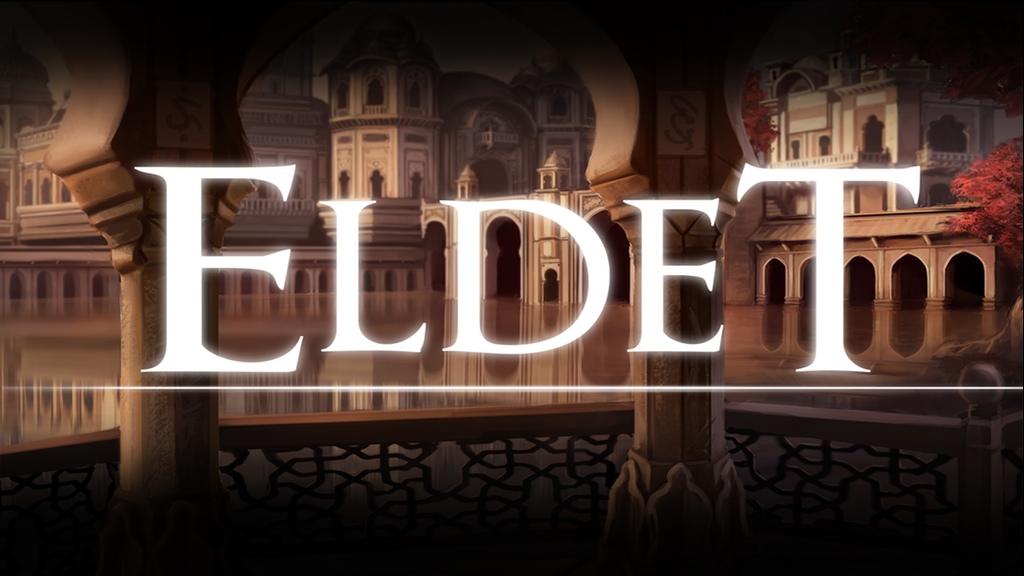In visual novel Eldet, players assume the role of Kunal, a man in his early 20s. Set in an alternate version of Earth that’s “based loosely on Andalusia (southern Spain), Sweden, Cambodia, Algeria, and India” and is full of magic, Kunal’s Big Dilemma is that although he comes from a magical family and has in fact spent 16 years studying at the college of mages, he starts to think that he might not have any magical powers of his own.
While the promise of adventure may be enough to draw players in (a “tomb raider” hires Kunal and the lead character discovers he may be blessed with magic after all), it’s the game’s dating sim gameplay that really sets its otherwise familiar story apart from the rest.
The storyline still works even if players choose to keep things non-sexual.
Developer Marccus promises several same-gender love interests for our leading man; a variety of hunks of different ethnicities and different body types (not all of them are chiseled within an inch of their lives) that Kunal can fall for. It’s also worth noting that players can still have romances with these characters and that the storyline still works even if players choose to keep things non-sexual.
Marccus explains that one of “primary philosophies” of Eldet is that “diversity matters” and it seems that gamers have really responded to this attention to representation. Not only did the game blitz past its $7,000 Kickstarter funding goal in just over 24 hours but as of the time of writing, fans have pledged over $21,000 towards making the game, which has also seen them unlock all of the stretch goals (secondary love interests).
“LGBT representation in games is so rare, and so white, and it’s just really great to see something like this happening,”
And it’s not just that lofty crowdfunding total that proves that gamers are eager for characters that look like them as both Marccus’ and the Eldet development Tumblr feature tons of messages of gratitude, praising the developer for what looks like some seriously positive rep. “LGBT representation in games is so rare, and so white, and it’s just really great to see something like this happening,” writes one anonymous user, with those who’ve played the Eldet demo also praising Marccus for pairing it with a gorgeous art style, superb character designs and some fantastic music too.
Moreover, Eldet vows to subvert tropes. As mentioned, Kunal’s biggest problem has nothing to do with his sexuality. Marccus notes that “while coming out stories/narratives that focus on lgbt themes are undoubtedly important, this visual novel will include lgbt characters dealing with the sorts of issues you’d expect in any other fantasy story.”
LGBT people are more than just… coming out stories
Indeed, while LGBT gamers (and viewers of both TV shows and movies) certainly appreciate storylines about coming out – seeing gay and bi characters struggle and eventually succeed in being their true selves certainly helped me figure out my identity – LGBT people are more than just these coming out stories and it makes little creative sense to constantly focus on this aspect.
For example, one large frustration with (BioWare fantasy RPG) Dragon Age: Inquisition was that gay mage Dorian’s personal quest was about his father’s disappointment about his sexuality and his father’s attempts to ‘cure’ Dorian’s sexuality with magic. In a game that featured humongous dragons, rift-spanning adventures and a player character who can send bolts of bright, green fire from their hand, it seemed particularly reductive that the game also featured a quest about homophobia and conversion therapy.
It’s true that plenty might say that Eldet – which also features trans, asexual and wlw (women who love women) characters – is ‘pandering’ – ultimately, it’s still incredibly positive that a game like this, which serves underrepresented groups of people, is getting made. There are also wider conversations that can be had about whether or not a game like Eldet could be made without crowdfunding and how other games can follow suit, but for now we’ll be keeping an eye on the game and looking forward to its 2017 release.



